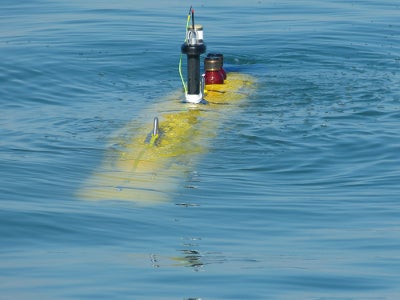
Bluefin Robotics has completed deep-water testing of a specialised unmanned underwater vehicle (UUV), known as Submarine Hold at Risk (SHARK), for the US Defense Advanced Research Projects Agency (DARPA).
The tests were carried out as part of the Phase 2 development effort under DARPA’s Distributed Agile Submarine Hunting (DASH) programme, which aims to develop new technology by using scalable and affordable distributed technology systems to meet anti-submarine warfare (ASW) surveillance needs.
Developed by a team led by Applied Physical Systems (APS), the system was put through six days of operational testing, including two 4,450m dives for around 11 hours, at the company’s dock in Quincy, Massachusetts, US.
During the testing, various new vehicle capabilities for its modular UUVs were also examined by the Bluefin team, which included an extended operational depth rating, an advanced pressure vessel design, a new power system, a newly available high-powered acoustics transducer system, and a transportable docking head launch and recovery system.
DARPA has also tested the Science Applications International Corporation (SAIC)-developed fixed passive sonar node prototype, Transformational Reliable Acoustic Path System (TRAPS), designed as part of the DASH programme to offer coverage over an extended area.
Both the prototype systems validated functional sonar, communications and mobility at deep seafloor, while meeting the programme’s requirements and enabling to further enhance deep-ocean distributed sonar capabilities to help find and track quiet submarines.
The two platforms are set to further demonstrate their combined core sonar functionality, subsequently followed by multiple sonar nodes realisation and integration of the SHARK UUV with its sonar.
Woods Hole Oceanographic Institution, a third DASH team member, provided support to both teams by supllying physical network layers.
Image: A SHARK UUV undergoing deep-sea testing. Photo: courtesy of Bluefin Robotics image.





